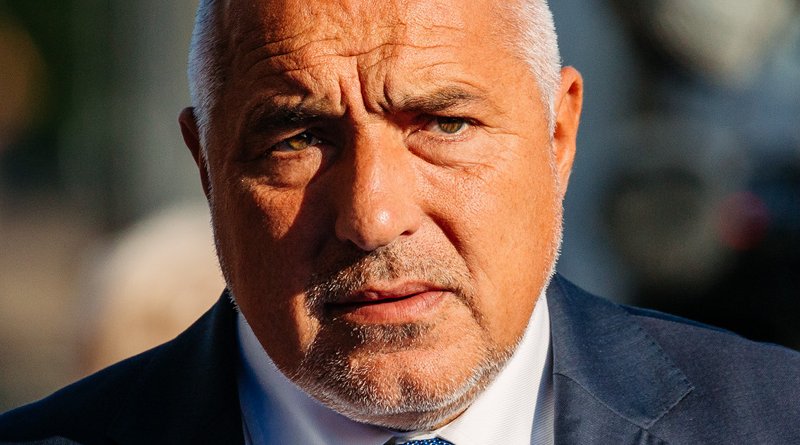Bulgaria: PM Borisov May Struggle To Form New Coalition Despite Election Victory
By RFE RL
(RFE/RL) — Bulgarian Prime Minister Boyko Borisov’s center-right party is set to come in first in the April 4 parliamentary elections, but it could struggle to form a ruling coalition after parties behind the mass anti-government protests last summer won a large share of the vote.
With nearly all the ballots counted, the Citizens for European Development of Bulgaria party (GERB) party was ahead with 26 percent of the vote, the Central Election Commission said, putting it on track for its worst performance since Borisov formed it about 15 years ago.
There Is Such A People, a new, anti-establishment party formed by popular Bulgarian talk-show host Stanislav Trifonov, was running second with 17.9 percent, followed by the Socialist Party, the successor to the Communist Party, with 15 percent.
The mostly ethnic Turkish-backed Movement for Rights and Freedoms (DPS) and the liberal, Western-leaning grouping Democratic Bulgaria were next with 9.9 percent and 9.7 percent of the vote, respectively.
Get Up! Get Out!, a new, center-left alliance launched by former Ombudsman Maya Manolov, received 4.8 percent of the vote.
No other party received more than the 4 percent minimum required to enter parliament.
The results were a clear blow for GERB and the Socialist Party — which posted its worst parliamentary election performance since the collapse of communism in 1989.
GERB is expected to get about 70 seats in the 240-seat legislature, but it will need at least 121 seats to form a new, stable government. That will not be easy, analysts said.
Nationalist parties, GERB’s main coalition partners over the past four years, did not receive enough votes to enter parliament. Several of the parties that did make it into parliament have vowed not to work with GERB.
“For the first time in 11 years, a very powerful populist force like There Is Such A People will be in parliament, meaning that a period of political instability is ahead of us,” political analyst Ognyan Minchev told the AP news agency.
“This is the start of a very dynamic political change in Bulgaria, which will go through two or three elections, and the next ones are around the corner,” he added.
As the outcome of the elections became clear, Borisov, 61, called on his opponents to join forces to form a government.
“I offer you peace. I offer that we put together experts and people who will undertake the [government] responsibilities,” Borisov said in a video on Facebook.
In a clear knock at his novice opponents like Trifonov, Borisov claimed he was better positioned to lead Bulgaria, especially in a time of crisis.
“You have no expertise. You have no people. You don’t understand things. You need to learn, while our potential is huge,” Borisov told his opponents.
Borisov has served as prime minister for nearly the entire period since 2009, with a brief stint out of office in 2013-14.
Emilia Zankina, a Bulgaria expert and dean of Temple University’s Rome campus, told RFE/RL prior to the election that it would be “almost impossible” for GERB and Borisov to form a ruling coalition because the parties expected to make it into parliament were so “ideologically incongruent.”
“Forming a stable government will be almost possible,” Zankina said. “I don’t see this government lasting too long.”
Parvan Simeonov, a Sofia-based political analyst for Gallup International, told RFE/RL on April 5 that the weak performance by GERB and Socialists — the country’s two dominant parties since the late 2000 — indicated a strong preference for change.
The analyst said the three parties behind the anti-corruption protests in the summer — There Is Such A People, Democratic Bulgaria, and Get Up!, Get Out! — could potentially form a coalition government with the tacit support of the Socialist Party.
“There still could be some behind-the-scenes arrangement [to keep Borisov in power] but I think Bulgarian society would not let him form another government,” Simeonov said, adding there could be more protests if the prime minister seeks to hang on.
If the six parties are unable to form a coalition government, the constitution requires the president to appoint an interim government to prepare for new parliamentary elections later in the year.
Bulgaria is ranked last among European Union countries on Transparency International’s Corruption Perceptions Index, and it has one of the highest coronavirus death rates in the EU.
Members of the GERB party have been involved in a series of recent corruption scandals, sparking the country’s largest anti-government demonstrations in years.
Tens of thousands of demonstrators took to the streets across the country last summer to protest corruption and the alleged use of the judiciary to target GERB’s political rivals.

